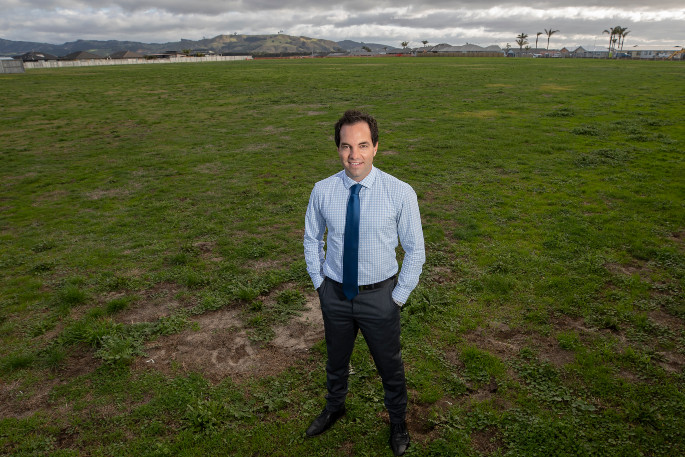If you could design your own school, a large empty field is a good place to start. Lots of space to run around on. The ultimate wish list could include being surrounded by a friendly beachside community.
Surf, golden sands and a lively marine environment nearby. But what about making education truly great again and adding in immense dollops of science, values, music, art, environment and culture?
The planning and discussion for a new school in Papamoa East began about ten years ago, with enterprising individuals forecasting the population growth could sustain a new Catholic school that would also have its roots going back more than 150 years.
The selection of Anthony Mills as the new principal is an inspired choice – as well as a teacher, he's a musician, artist, surfer, husband, father of five and keen science educator. He starts work on Monday.
If all goes to plan, Suzanne Aubert Catholic School will be rising from an empty paddock in Kamahi St, opening in term one of 2021 with an expected roll of 100-150 Year 0-6 children.
'All the building plans and design are completed and have gone to tender,” says Anthony, fresh from an assistant principal role at Tauranga's St Mary's Catholic School.
'Once the foundations are in, it should go pretty quickly.”
Prior to St Mary's, Anthony taught at St Thomas More Catholic School, where he was director of religious studies and also worked as an across-schools coordinator with other Catholic schools. Prior to that he taught in Hamilton.
'I grew up in a Catholic family in Hamilton, we were always quite involved with the church and I am really passionate about Catholic education.”
He plays drums and guitar and leads music ministry with his wife at St Thomas More church on Sundays.
Having a Catholic school pop up in the Papamoa area caters for a wide demographic from Papamoa through to Te Puke and Pukehina.
'Some families want their child to have an education at a Catholic school so they're happy to travel to do that.”
Looking at the strength of the Catholic schools in the area, it's clear that parents see a Catholic education being a great foundation for their children. St Thomas More is capped at 240 pupils, St Mary's is capped at 500, and Suzanne Aubert will be capped at 250. Anthony believes Suzanne Aubert will reach that figure by 2024, only three years away.
Catholic schools are known to perform well in terms of education graduates and in terms of their beliefs and values, with students learning to demonstrate that in their actions.
Why Suzanne Aubert?
'Suzanne Aubert was a French nun who arrived in New Zealand in 1860. She did missionary work with the homeless, orphans, young mums and unemployed people, helping those who were on the fringe of society.”
Suzanne set up the Sisters of Compassion in Whanganui to serve and help those in need and connected with the Maori community, becoming tangata whenua over time.
'She was a scientist and botanist combining western knowledge and matauranga Maori with her medicinal planting. These rongoa became central to her healing ministry.”
Suzanne Aubert is known in the Catholic Church as ‘venerable' which means she is on the journey to becoming a saint.
As a scientist Suzanne should translate well into the new school curriculum.
The school will have a close partnership with the Sisters of Compassion who are now largely based in Wellington.
Anthony's looking forward to the official turning of the sod next month.
The school is being developed alongside the Ministry of Education, the Catholic Diocese, local iwi and the Sisters of Compassion.
'We're also looking forward to consulting with whanau and the community as we develop the vision.”
He's keen to get started, with a six-month science leadership sabbatical through the Royal Society of New Zealand in 2016 still resonating.
Clearly science, innovation and the arts are going to be strong points, with purposeful planting, biosecurity projects and environmental care programmes already in the planning.
'Especially post-national standards, schools are redefining themselves and it's a great opportunity to be really creative and innovative with a localised curriculum.”



0 comments
Leave a Comment
You must be logged in to make a comment.